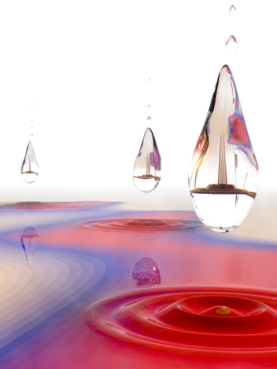[aesop_image img=”https://hilite.org/core/wp-content/uploads/2014/03/dropletons.jpg” caption=”SCIENTIFICAMERICAN.COM / SOURCE” align=”left” captionposition=”left” lightbox=”off”]Say hello to the dropleton.
This newly discovered marvel is not just a new quasiparticle, but a state of matter in its own right, behaving similarly to a conventional liquid. It was discovered when scientists at the University of Colorado focused a laser on a piece of gallium arsenide in an effort to form excitons. (Excitons are special quasiparticles formed when an atom is struck by a photon, knocking loose a valence electron. The electron is held in a bound state by the “hole” left in the electron coupled with outside forces acting upon it). When the laser was focused on the semiconductor, the result was not at all what the scientists had expected. The scientists anticipated the formation of biexcitons (two bound excitons acting as a molecule) and an overall upward trend in energy, but quite the opposite was seen. The scientists drew the conclusion that they must have created something other than biexcitons as a result of this experiment.
This proved to be the case. The scientists had actually created an entirely new state in which the electron-hole pairings of excitons break down and four to six of the particles form a poly-exciton complex described as similar to a “quantum fog” of sorts.
Astonishingly, the droplets are stable enough to be observed by scientists. They only exist for an infinitesimally small amount of time (25 trillionths of a second,) but this is long enough that scientists are able to observe and document them. The dropleton’s size also makes it relatively easy to observe; it is comparable in size to a small bacteria.
The discovery of this new state does not, as yet, promise to yield many new forms of technology or innovations, as the dropleton is still in its infancy. One possible benefit that could be yielded, however, is a better understanding of how particles interact on a quantum level.
That’s it for me. Expect another post within two weeks. For science!




























![Keep the New Gloves: Fighter Safety Is Non-Negotiable [opinion]](https://hilite.org/wp-content/uploads/2024/12/ufcglovescolumncover-1200x471.png)
















































![Review: “We Live in Time” leaves you wanting more [MUSE]](https://hilite.org/wp-content/uploads/2024/12/IMG_6358.jpg)
![Review: The premise of "Culinary Class Wars" is refreshingly unique and deserving of more attention [MUSE]](https://hilite.org/wp-content/uploads/2024/12/MUSE-class-wars-cover-2.png)
![Introducing: "The Muses Who Stole Christmas," a collection of reviews for you to follow through winter [MUSE]](https://hilite.org/wp-content/uploads/2024/12/winter-muse-4.gif)
![Review: "Meet Me Next Christmas" is a cheesy and predictable watch, but it was worth every minute [MUSE]](https://hilite.org/wp-content/uploads/2024/11/AAAAQVfRG2gwEuLhXTGm3856HuX2MTNs31Ok7fGgIVCoZbyeugVs1F4DZs-DgP0XadTDrnXHlbQo4DerjRXand9H1JKPM06cENmLl2RsINud2DMqIHzpXFS2n4zOkL3dr5m5i0nIVb3Cu3ataT_W2zGeDAJNd_E-1200x884.jpg)
![Review: "Gilmore Girls", the perfect fall show [MUSE]](https://hilite.org/wp-content/uploads/2024/11/gilmore-girls.png)
![Review in Print: Maripaz Villar brings a delightfully unique style to the world of WEBTOON [MUSE]](https://hilite.org/wp-content/uploads/2023/12/maripazcover-1200x960.jpg)
![Review: “The Sword of Kaigen” is a masterpiece [MUSE]](https://hilite.org/wp-content/uploads/2023/11/Screenshot-2023-11-26-201051.png)
![Review: Gateron Oil Kings, great linear switches, okay price [MUSE]](https://hilite.org/wp-content/uploads/2023/11/Screenshot-2023-11-26-200553.png)
![Review: “A Haunting in Venice” is a significant improvement from other Agatha Christie adaptations [MUSE]](https://hilite.org/wp-content/uploads/2023/11/e7ee2938a6d422669771bce6d8088521.jpg)
![Review: A Thanksgiving story from elementary school, still just as interesting [MUSE]](https://hilite.org/wp-content/uploads/2023/11/Screenshot-2023-11-26-195514-987x1200.png)
![Review: "When I Fly Towards You", cute, uplifting youth drama [MUSE]](https://hilite.org/wp-content/uploads/2023/09/When-I-Fly-Towards-You-Chinese-drama.png)
![Postcards from Muse: Hawaii Travel Diary [MUSE]](https://hilite.org/wp-content/uploads/2023/09/My-project-1-1200x1200.jpg)
![Review: "Ladybug & Cat Noir: The Movie," departure from original show [MUSE]](https://hilite.org/wp-content/uploads/2023/09/Ladybug__Cat_Noir_-_The_Movie_poster.jpg)
![Review in Print: "Hidden Love" is the cute, uplifting drama everyone needs [MUSE]](https://hilite.org/wp-content/uploads/2023/09/hiddenlovecover-e1693597208225-1030x1200.png)
![Review in Print: "Heartstopper" is the heartwarming queer romance we all need [MUSE]](https://hilite.org/wp-content/uploads/2023/08/museheartstoppercover-1200x654.png)




